Juanita, a Trans-Cendental Leader
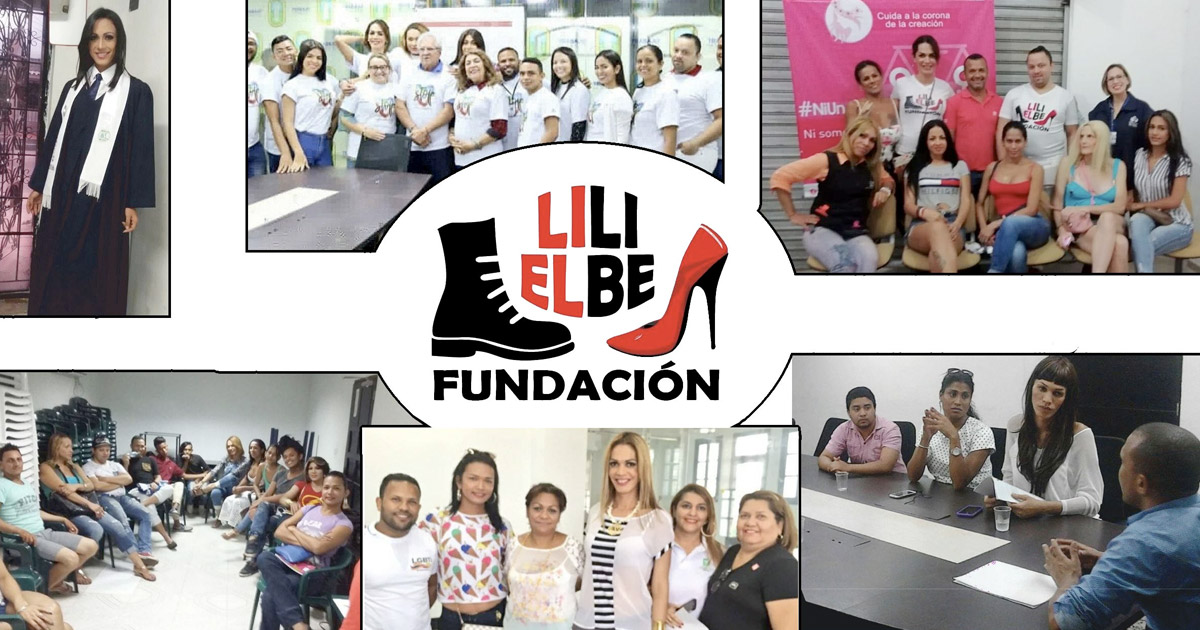
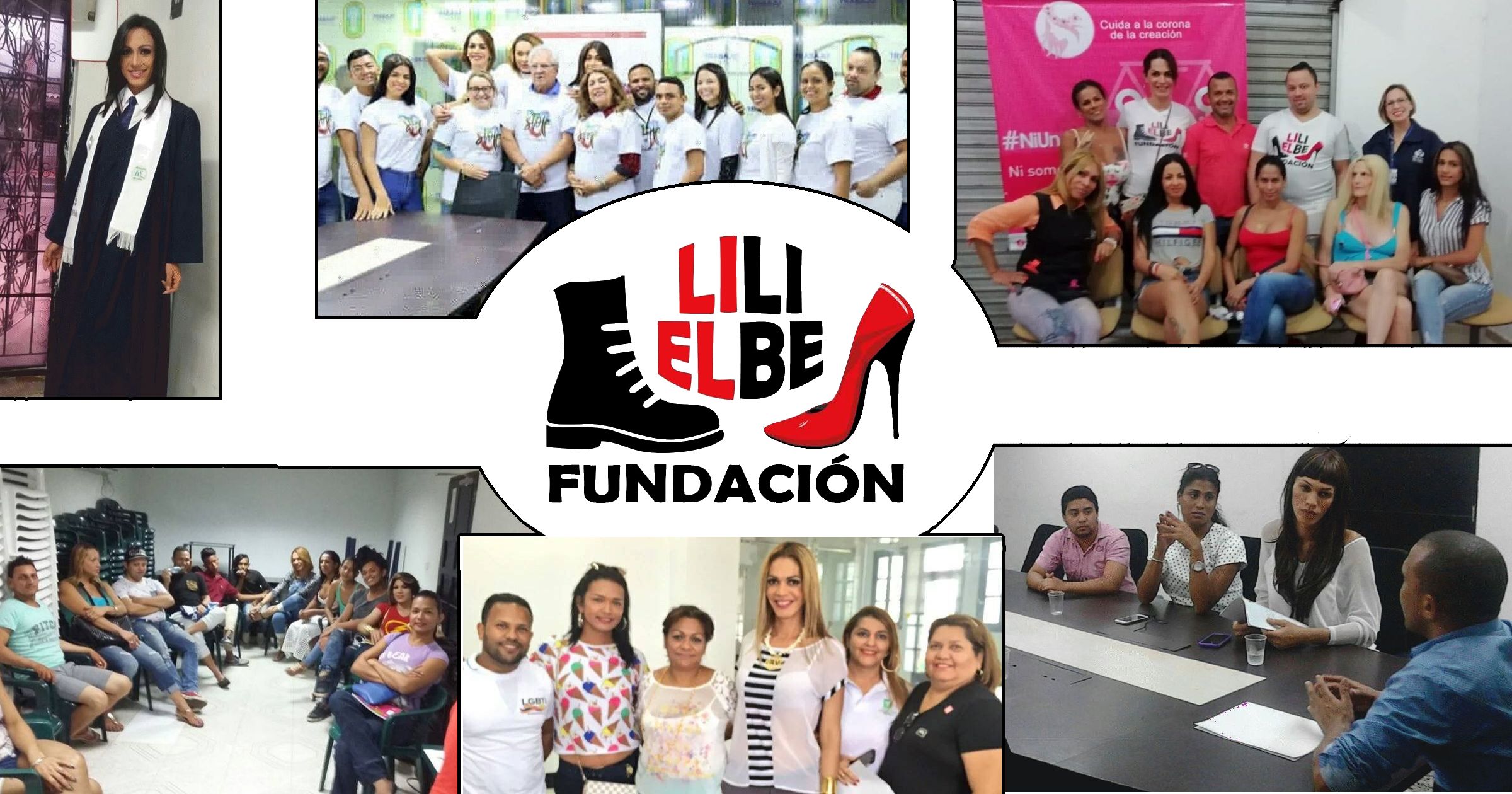
Juanita Ortiz and the work of the Lili Elbe Foundation
by Juanita Isabel Ortiz Márquez

Here in Soledad, Colombia, I am committed to strong and visible LGBTQ activism as a transgender leader in the community.
My experience in activism and leadership began at an early age. When I was eleven, I began to recognize myself as female. This was a difficult time for me, made even more difficult by my parents divorcing and my mother leaving me with my father, who was not able to support me. Later, I would meet two missionaries who were visiting my neighborhood. I learned about their church, The Church of Jesus Christ of Latter-day Saints, and was invited to attend church by a great friend.
Every Sunday, we dedicated as a day of rest for our Heavenly Father and I learned more about the Restored Gospel. This led me to be baptized as a member of the church. I was motivated to preach the gospel in my neighborhood, with the missionaries being my example. I preached to my friends in my house. I was eventually called as a stake missionary. I knew the word of God and felt the love of my brothers in faith and the acceptance of people. However, deep down, in my heart, I didn’t feel completely fulfilled because I wasn’t living as the woman I knew I really was. It was painful and confusing, and I felt sinful. I started making small changes at first. My father noticed, and those at church began to notice as well. I began to wear makeup, explaining to others that it was because I had acne problems. As time went on, I began to be treated differently as the changes I was making were becoming more noticeable.
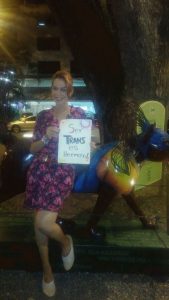 After much prayer and pain, I decided to leave the Church. I didn’t feel a part of it. I was being excluded because I was different. I wasn’t the man that they expected me to be. While this was painful, I just couldn’t continue to hide who I really was to please them or meet their expectations. I always felt like a woman.
After much prayer and pain, I decided to leave the Church. I didn’t feel a part of it. I was being excluded because I was different. I wasn’t the man that they expected me to be. While this was painful, I just couldn’t continue to hide who I really was to please them or meet their expectations. I always felt like a woman.
I also dropped out of school. There too I wasn’t accepted. I couldn’t adhere to school rules about gender conformity. The school didn’t have any understanding of transgender issues. I was rejected by teachers and classmates. Eventually, I went to live with my mothers as my father rejected me too and nobody in my neighborhood would be associated with me.
For a long time, I had no friends. The only people I had contact with were my mothers, my older brother, and younger sister. I had two other sisters, but they lived with my father and didn’t talk to me. My older brother beat me and treated me very badly, causing a lot of damage physically, emotionally, and mentally.
There was a hairdresser that worked out of a room in my mother’s house. I began to spend time there, meeting gay people and wanting to be more like them. They became special people to me. They also were into using psychoactive substances. These drugs became a refuge for me as a struggled with the social pressure and challenges of not being their definition of normal. I also struggled financially, and I turned to sex work. I didn’t have any other skills, like cutting hair, to rely on. Transgender people often turn to prostitution because getting other jobs in Colombia is difficult for them. I lost many friends to disease and violence as society marginalized us.
Lacking access to proper medical advice or medications, I looked for homegrown ways to transition. I took drugs that weren’t prescribed and injected myself with liquid silicone. Like other transgender people, medical professionals didn’t consider my transitioning to me important and access to proper medical care was limited. It wasn’t until I was seriously ill with tuberculosis that I finally received medical treatment, but even that treatment was hindered due to assumptions that were made about me. Initially, I was diagnosed with HIV, even though no testing had been done. It was just assumed because I was transgender and sick that I must have HIV. That’s how prejudiced the medical community was. Eventually, I was properly diagnosed and treated, but the delay caused permanent damage to my vocal cords. To this day, my voice is very hoarse.
I found work in a hair salon and learned how to be a beautician. I decreased the frequency is sex work, and I stopped using drugs and illicit hormones. I understood that these things risked my health and life. This was a new stage in my life where I saw things from a different perspective. My experience has helped me to understand the impact of being marginalized on the people I interacted with. I understood the harm that is inflicted by society and the Church when they marginalize people. At first, I stayed quiet, as I didn’t want to risk further rejection for expressing my views. I refrained from public spaces for fear of being attacked. I stayed inside mostly. I, along with those around me, only dreamed about a society where we could live without fear. Little by little though, there was a spark igniting within.
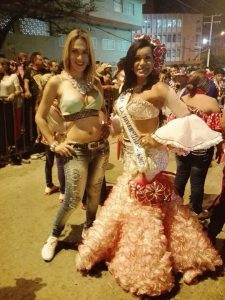
That spark led to a flame, and that flame led me to risk participating in the Soledad city carnival, where amazingly I was crowned queen. It was beautiful. That experience propelled me to start doing something about the issues that disturbed me, like the lack of proper healthcare available to transgender people and other vulnerable populations. I began to meet with leaders who were knowledgeable about the prevention of HIV and other sexually transmitted diseases. I learned a lot and this knowledge empowered me in these areas. I wanted to do more, and I realized that I had been a victim of a hierarchical, systemic, political, and social patriarchal system. I also realized that I had the same rights as any person in civil society.
I began the work that I’ve been engaged in ever since, working with social organizations to address the issues of health rights and to bring awareness to issues affecting transgender people. This has been hard work, as I saw gaps in what these organizations were providing. Transgender women were being left behind. My friends were dying, and nobody was doing anything to help. We were being excluded from our families, from educational institutions, and from a society that prevented us from being free in public spaces. I wanted to do more, and a great friend and activist encouraged me to strengthen and prepare myself to be a leader in my community to better help the transgender population.
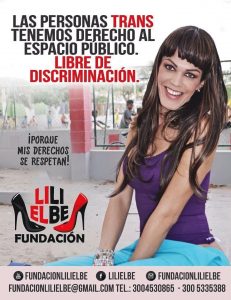 This is how the LILI ELBE Foundation was born. It was inspired by the life of a Danish woman written about in David Ebershoff’s novel The Danish Girl. The novel tells the story of Einar Wegener, a painter who was one of the first women to undergo sexual reassignment surgery. The LILI ELBE Foundation was the first organization to work for the rights of transgender people in the Caribbean region of Colombia. It was a wonderful experience being a part of the beginning of this work. It was needed so much as there was nobody else giving us support. We knocked on the doors of mayors’ offices in Barranquilla and Soledad seeking resources. We traveled to promote the work that we were doing. We worked with various health secretariats. We managed the distribution of condoms to transgender women. We secured spaces with other organizations to hold educational programming and build leadership in the community. I worked specifically as a coordinator in an international project to strategically secure benefits for transgender women. Sadly, this project failed and I left that position. However, I didn’t give up. I still worked tirelessly on issues important to me. We identified all transgender people in Soledad and worked with the mayor to create a liaison to the community, which was produced very good results.
This is how the LILI ELBE Foundation was born. It was inspired by the life of a Danish woman written about in David Ebershoff’s novel The Danish Girl. The novel tells the story of Einar Wegener, a painter who was one of the first women to undergo sexual reassignment surgery. The LILI ELBE Foundation was the first organization to work for the rights of transgender people in the Caribbean region of Colombia. It was a wonderful experience being a part of the beginning of this work. It was needed so much as there was nobody else giving us support. We knocked on the doors of mayors’ offices in Barranquilla and Soledad seeking resources. We traveled to promote the work that we were doing. We worked with various health secretariats. We managed the distribution of condoms to transgender women. We secured spaces with other organizations to hold educational programming and build leadership in the community. I worked specifically as a coordinator in an international project to strategically secure benefits for transgender women. Sadly, this project failed and I left that position. However, I didn’t give up. I still worked tirelessly on issues important to me. We identified all transgender people in Soledad and worked with the mayor to create a liaison to the community, which was produced very good results.
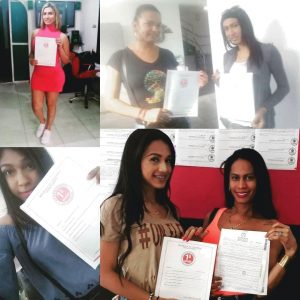 I worked hard and was appointed in the mayor’s office of my city as a public official. Working with the first last, we secured forty name and sex changes on citizen cards, ensuring that the gender identities were respected. We helped a transgender woman become the first to complete high school. We broke barriers. We managed to have the first LGBT Pride march where transgender women and men were very visible. We made sure that marcher’s right to be in the public space was enforced.
I worked hard and was appointed in the mayor’s office of my city as a public official. Working with the first last, we secured forty name and sex changes on citizen cards, ensuring that the gender identities were respected. We helped a transgender woman become the first to complete high school. We broke barriers. We managed to have the first LGBT Pride march where transgender women and men were very visible. We made sure that marcher’s right to be in the public space was enforced.
I’ve been through years of suffering, challenges, and change in my life. Having been a Latter-day Saint, and having that legacy of pioneers in my heart, I had an example in persevering through struggle. I never stopped praying and blessing my food. I still hold onto many principles I learned in the Church. Today, I see how I have been able to impact the lives of many people, just as the missionaries had an impact on me. Now I seek to become a member of the Soledad City Council and continue to work to strengthen the LILI ELBE Foundation to improve the lives of the LGBT population in terms of health, education, sports, and employment for people like me. I want to support education on gender issues and increase people’s understanding of the reality of transgender people and the realities they face.
I know without a doubt that my Heavenly Father loves me and has given me the strength to stand up. I know all my actions are as the scripture says, “And behold, I tell you these things that ye may learn wisdom; that ye may learn that when ye are in the service of your fellow beings ye are only in the service of your God.” (Mosiah 2:17)
Wonderful work, and a courageous journey. Thank you for all that you do.